WOLE SOYINKA AWARD FOR INVESTIGATIVE REPORTING
Winning Works 2010
Share this
Winner
 Nigeria’s economy is majorly dependent on crude oil; hence corruption in the institution vested with power of control over the country’s major source of survival must receive the full attention it deserves. No wonder Badejo’s serial, NNPC Insurance Programme, concerning the inflation of the premium by some insurers in the late ‘90s up to 2009 whose water shed was published as a front page of Business Day Newspaper on Tuesday 1 June 2010 has been adjudged a classic example and commentary on how the public and private sectors collude to misappropriate funds and defraud Nigerians and how the media through investigative journalism can best serve public interest by shedding light on such issues.
Nigeria’s economy is majorly dependent on crude oil; hence corruption in the institution vested with power of control over the country’s major source of survival must receive the full attention it deserves. No wonder Badejo’s serial, NNPC Insurance Programme, concerning the inflation of the premium by some insurers in the late ‘90s up to 2009 whose water shed was published as a front page of Business Day Newspaper on Tuesday 1 June 2010 has been adjudged a classic example and commentary on how the public and private sectors collude to misappropriate funds and defraud Nigerians and how the media through investigative journalism can best serve public interest by shedding light on such issues.
Displaying a rare attention to details; backing his report with data, facts and figures and painstakingly running the story in a whopping 10-serial plot thereby unravelling deeds that date back almost two decades, Badejo Ademuyiwa carefully reveals mammoth corruption in the management of the government-run programme. The implications for the Nigerian people are huge: the figures declared are indicative of foul play by the managers of the insurance scheme; and government is not interested in probing these misappropriations as some powers that be are involved in the mess, hence Nigerians suffer without hope for some respite in the near future
First Runner up
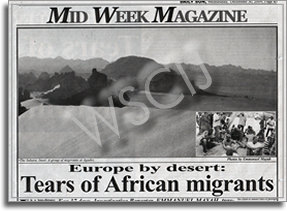 You would be right to call Emmanuel Mayah the hands-on-journalist. With a full understanding of the commitment required for an investigative piece, Mayah posed as an immigrant in the company of three human traffickers and travelled 37days, covering a total of 4, 318kilometers for his work, Europe by Desert: Tears of African Migrants published in Daily Sun Newspaper of Wednesday 30 December, 2010.
You would be right to call Emmanuel Mayah the hands-on-journalist. With a full understanding of the commitment required for an investigative piece, Mayah posed as an immigrant in the company of three human traffickers and travelled 37days, covering a total of 4, 318kilometers for his work, Europe by Desert: Tears of African Migrants published in Daily Sun Newspaper of Wednesday 30 December, 2010.
The report is a rich illustration, and gripping account of the heart renting experiences of Nigerians (mostly youths) in their desperation to pursue greener pastures outside a failing country. His account reveals trade-offs with prostitution, starvation, sex slavery in transit camps, desert bandit, corrupt custom systems, arduous toil in salt mines, voodoo, cruel thirst and death in the hot desert Nigerians have to make to realise their mostly unachievable sojourn to promise land.
The story which ensured the fraud academy mentioned in the report was shut down has since been republished on various websites across the world and Mayah has received commendations from religious community leaders, the Nigerian Press Council, the National Agency for Prohibition in Trafficking in Persons (NAPTIP) and he was also honoured at a public ceremony an ‘Anti Human Trafficking Ambassador’.
Second Runner up
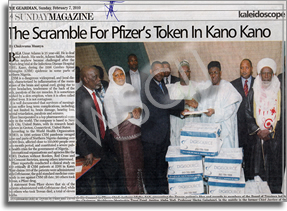 The Pfizer Trovan study which used untested drugs on 200 Nigerian children, at the Infectious Disease Hospital (IDH), Kano, during the 1996 Cerebro Spinal Meningitis (CSM) epidemic in some parts of Nigeria, left many permanently disabled and at least 11 people dead. Chukwuma Nuanya’s report The Scramble for Pfizer’s token in Kano (The Guardian, Sunday 7 February 2010) is a sequel to this gross human rights abuse and disregard for human life by the company and Kano state government officials which have protracted the process of funds settlements to victims or their beneficiaries for fourteen years after Pfizer agreed to provide settlement funds on the basis of no admission of liability in connection with the 1996 study.
The Pfizer Trovan study which used untested drugs on 200 Nigerian children, at the Infectious Disease Hospital (IDH), Kano, during the 1996 Cerebro Spinal Meningitis (CSM) epidemic in some parts of Nigeria, left many permanently disabled and at least 11 people dead. Chukwuma Nuanya’s report The Scramble for Pfizer’s token in Kano (The Guardian, Sunday 7 February 2010) is a sequel to this gross human rights abuse and disregard for human life by the company and Kano state government officials which have protracted the process of funds settlements to victims or their beneficiaries for fourteen years after Pfizer agreed to provide settlement funds on the basis of no admission of liability in connection with the 1996 study.
According to the reporter, the report was published despite threats, cajoling and offer to buy up the story by people in high authority.
Winner
 Peter Nkanga’s online winning entry, The pregnant prisoner is a single-subject 7-plot serial, first published on 234next.com of the NEXT Newspapers. It tells the truly sad story of a 17year old girl who became a victim of her supposed benefactor, a 50 year old man who allegedly plotted her imprisonment at the Kirikiri Female Prison for eight months after impregnating her. Peter’s report reinforces the incontestable potentials of investigative reporting to empower the oppressed by giving a chance for fairer hearing thereby ensuring social justice, even as it details the failings of the Nigerian legal system with the appointed magistrate absent four times for the hearing of the case.
Peter Nkanga’s online winning entry, The pregnant prisoner is a single-subject 7-plot serial, first published on 234next.com of the NEXT Newspapers. It tells the truly sad story of a 17year old girl who became a victim of her supposed benefactor, a 50 year old man who allegedly plotted her imprisonment at the Kirikiri Female Prison for eight months after impregnating her. Peter’s report reinforces the incontestable potentials of investigative reporting to empower the oppressed by giving a chance for fairer hearing thereby ensuring social justice, even as it details the failings of the Nigerian legal system with the appointed magistrate absent four times for the hearing of the case.
Apart from reporting the story in his media, 234next.com, Peter wrote to all ministries and agencies of the Lagos State Government and to the State Governor, eventually drawing the attention of the Ministry of Youth, Sports and Social Development which then took up the case. According to the report, the alleged culprit was arrested and has remained in prison facing prosecution as he is unable to meet the court’s bail conditions. On the other hand, the Lagos state government has since taken up the welfare of the lady and the baby she had while in prison.
Runner up
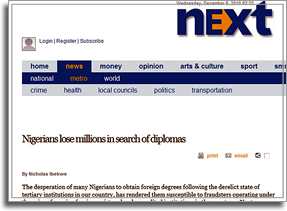 With the near collapse of tertiary education in Nigeria, there has been a proliferation of institutions claiming affiliations with foreign universities and professional bodies. Meanwhile, many of these institutions are mere vehicles of fraud thriving due to poor regulations and preference of Nigerian employers for employees with foreign degrees. Nigerians lose Millions in search of Diplomas a report published on 234next.com is an example of the extortions and fraud that characterise some of these institutions. It chronicles the extent to which these phoney institutions would go to defraud Nigerians, and more sadly the Nigerian government.
With the near collapse of tertiary education in Nigeria, there has been a proliferation of institutions claiming affiliations with foreign universities and professional bodies. Meanwhile, many of these institutions are mere vehicles of fraud thriving due to poor regulations and preference of Nigerian employers for employees with foreign degrees. Nigerians lose Millions in search of Diplomas a report published on 234next.com is an example of the extortions and fraud that characterise some of these institutions. It chronicles the extent to which these phoney institutions would go to defraud Nigerians, and more sadly the Nigerian government.
Winner
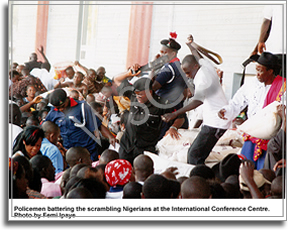 Femi Ipaye’s The great scramble for Patience Jonathan’s Rice published on Thursday 30 September 2010 in the P.M. News, is a direct statement on the tangibility of poverty in Nigeria, the shameful politics of handouts and the failures of security agencies in their primary duty of protecting the people.
Femi Ipaye’s The great scramble for Patience Jonathan’s Rice published on Thursday 30 September 2010 in the P.M. News, is a direct statement on the tangibility of poverty in Nigeria, the shameful politics of handouts and the failures of security agencies in their primary duty of protecting the people.
Ipaye had to stand on a fence hidden under a tree to take the pictures at the risk of being apprehended by uniformed men. Through his camera lens, he has presented us with vivid pictures of the state of the Nigerian nation, challenging us to ponder on what the future holds, given these present realities. He has thus been adjudged and now pronounced winner of the Photo-journalism category of the 2010 Wole Soyinka Award for Investigative Reporting.
First Runner-up
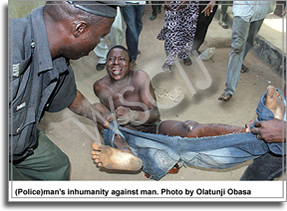 True to his training, Olatunji Obasa captures a worrying image of the emotional, psychological, and physical oppression men of the Nigerian Police subject the Nigerian people to many times for absolutely no reason in his photo entry captioned ‘(Police) man’s inhumanity against man’ and published in The News Magazine of June 21, 2010 . The picture depicts fear and helplessness in the victim’s eyes, sweat (from man-handling his prey) on the brow of the aggressor, and the helplessness of passers-by. Today it is this victim, tomorrow, it could be any other Nigerian; what are stakeholders doing to curb the excesses of the Nigerian law enforcement agencies?
True to his training, Olatunji Obasa captures a worrying image of the emotional, psychological, and physical oppression men of the Nigerian Police subject the Nigerian people to many times for absolutely no reason in his photo entry captioned ‘(Police) man’s inhumanity against man’ and published in The News Magazine of June 21, 2010 . The picture depicts fear and helplessness in the victim’s eyes, sweat (from man-handling his prey) on the brow of the aggressor, and the helplessness of passers-by. Today it is this victim, tomorrow, it could be any other Nigerian; what are stakeholders doing to curb the excesses of the Nigerian law enforcement agencies?
Second Runner-up
 Call it daunting audacity or sheer disregard for the Nigerian citizenry and rule of law, the former President of the Federal Republic of Nigeria Late Umar Musa Yar’Adua was sneaked into the country amidst tight security and engulfed in darkness after 90days of sparse information on his absence and state of health.
Call it daunting audacity or sheer disregard for the Nigerian citizenry and rule of law, the former President of the Federal Republic of Nigeria Late Umar Musa Yar’Adua was sneaked into the country amidst tight security and engulfed in darkness after 90days of sparse information on his absence and state of health.
Aghaeze Sunday in his pictures published in This Day Newspaper on the same day, Wednesday 24 February 2010 titled ‘The return of a President’ covers the entering entourage of the president. What other way to unravel a top government secret than through pictures! Aghaeze risked his life with unfriendly weather conditions and heavily-secured environment to bring images of the president’s return and state of health to the public.
